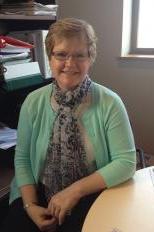






 Debby Meyer, WCB fund development directorIn the offices at 754 Williamson St., six black and white photographs hang on the wall and welcome visitors. Each photograph is a portrait of an early secretary or director of the Wisconsin Council of the Blind and Visually Impaired, and many of these leaders were blind or visually impaired in some way. They are a constant reminder to all who seek the help of the Council that blindness and visual impairment do not prevent people from accomplishing great things in life.
Debby Meyer, WCB fund development directorIn the offices at 754 Williamson St., six black and white photographs hang on the wall and welcome visitors. Each photograph is a portrait of an early secretary or director of the Wisconsin Council of the Blind and Visually Impaired, and many of these leaders were blind or visually impaired in some way. They are a constant reminder to all who seek the help of the Council that blindness and visual impairment do not prevent people from accomplishing great things in life.
“It’s a great place to work doing great, very needed work,” said Debby Meyer, fund development director of the Wisconsin Council of the Blind and Visually Impaired (WCB). “And if there was something I could shift it would be people’s perception of who might use what we do.”
Every seven minutes, someone in the U.S. will lose the full function of their eyes, but Meyer explained that many people who are losing some functionality of their vision do not consider themselves to be visually impaired.
As the only statewide organization of its kind, WCB’s direct services, community education, and therapy programs are significant to Wisconsin residents with low or changing vision and blindness. A board of blind and visually impaired individuals directs the Council, and WCB is a Community Shares partner.
The White Cane Annual Fund provides support for the Council. The name stems from the White Cane Law, which states that operators of vehicles must stay at least 10 feet away from a pedestrian carrying a white cane, one of the walking tools used by a blind or visually impaired person.
Within the WCB offices, the Sharper Vision Store provides access to many tools used by the blind and visually impaired. The WCB added the Sharper Vision Store within the last 20 years to its location on Williamson Street. The store’s merchandise serves to enhance the lives of people experiencing vision loss, or are blind or visually impaired.
Within the last four years, WCB established an online component for the store, which increases the Council’s outreach and enables the community to shop for the products they need more easily. Many of these resources are difficult to find anywhere else.
According to Brent Perzentka, Sharper Vision Store staff member, the majority of clients WCB receives are senior citizens with macular degeneration, an eye disease that decreases the ability to see objects clearly.
The physical store offers magnifiers of varying size, intensity, and purpose to complement each person’s vision problem and the task they want to complete. The Sharper Vision Store also stocks talking watches and clocks, braille watches, large print products, and more useful tools for people with vision problems.
The store is part of WCB’s direct service, but the Council was originally established as an advocacy group in 1952.
“When we talk about advocacy, it’s a lot to do with any kind of discrimination,” said Meyer, “but a lot of it has to do with access.”
When the state turned down federal funding for the expansion of Amtrak throughout Wisconsin, the blind community was “devastated,” said Meyer, because it is not possible to get everywhere through the bus system. Other than transportation, significant advocacy issues that the council addresses include employment, discrimination, and school issues for K-12 and higher education.
In addition to legislative advocacy, WCB partners with UW-Madison’s Department of Ophthalmology and Visual Sciences to provide low vision therapy.
Council member Marshall Flax, a certified low vision therapist, provides vision rehabilitation services at University Station Eye Clinic. Flax is also a certified orientation and mobility specialist, which means that he helps clients orient themselves to new environments so they can be as independent as possible.
“What is it you can’t do now because of your vision that you want to be able to do?” Flax asks his clients, and he helps them achieve those goals.
Through mobility and orientation therapy, Flax shows his clients that visual impairment and blindness do not control their lives. He empowers his clients by helping them realize their independence.
The WCB reaches out to blind or visually impaired individuals, and it also provides education services for the public and professionals as well. Through speaking engagements, WCB informs people about specific issues related to vision loss. The Council offers webinars that train professionals in new technology, like e-readers, that are useful for people with low or changing vision.
“Blindness is just one thing people learn to adapt to and live really full lives,” said Meyer.
|
|
|
Welcome to the Madison Commons, a website designed to provide news and information about all of Madison's neighborhoods and a crossroads for the discussion of community issues. The name comes from the idea of a village commons, a place for news, talk, debate, and some entertainment, too, that's open to everyone.
All rights reserved. Read more about the Madison Commons and its partners.

